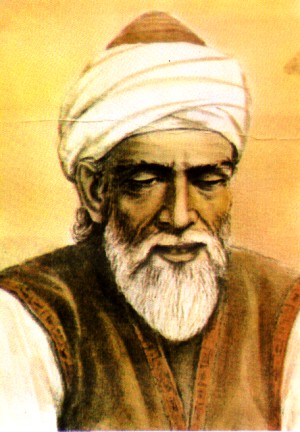Abu al-Wafa' Buzjani (nonfiction): Difference between revisions
(Created page with "Abū al-Wafāʾ, Muḥammad ibn Muḥammad ibn Yaḥyā ibn Ismāʿīl ibn al-ʿAbbās al-Būzjānī or Abū al-Wafā Būzhjānī (Persian: ابوالوفا بوزجانی or...") |
No edit summary |
||
| (2 intermediate revisions by the same user not shown) | |||
| Line 1: | Line 1: | ||
Abū al-Wafāʾ, Muḥammad ibn Muḥammad ibn Yaḥyā ibn Ismāʿīl ibn al-ʿAbbās al-Būzjānī or Abū al-Wafā Būzhjānī (Persian: ابوالوفا بوزجانی or بوژگانی) (10 June 940 – 15 July 998) was a Persian mathematician and astronomer who worked in Baghdad. | [[File:Buzjani.jpg|thumb|Abu al-Wafa' Buzjani.]]'''Abū al-Wafāʾ''', '''Muḥammad ibn Muḥammad ibn Yaḥyā ibn Ismāʿīl ibn al-ʿAbbās al-Būzjānī''', or '''Abū al-Wafā Būzhjānī''' (Persian: ابوالوفا بوزجانی or بوژگانی) (10 June 940 – 15 July 998) was a Persian [[Mathematician (nonfiction)|mathematician]] and astronomer who worked in Baghdad. | ||
He made important innovations in spherical trigonometry, and his work on arithmetics for businessmen contains the first instance of using negative numbers in a medieval Islamic text. | He made important innovations in spherical trigonometry, and his work on arithmetics for businessmen contains the first instance of using negative numbers in a medieval Islamic text. | ||
He is also credited with compiling the tables of sines and tangents at 15 ' intervals. He also introduced the secant and cosecant functions, as well studied the interrelations between the six trigonometric lines associated with an arc. His ''Almagest'' was widely read by medieval Arabic astronomers in the centuries after his death. He is known to have written several other books that have not survived. | He is also credited with compiling the tables of sines and tangents at 15' intervals. He also introduced the secant and cosecant functions, as well studied the interrelations between the six trigonometric lines associated with an arc. His ''Almagest'' was widely read by medieval Arabic astronomers in the centuries after his death. He is known to have written several other books that have not survived. | ||
== In the News == | == In the News == | ||
| Line 11: | Line 11: | ||
== Fiction cross-reference == | == Fiction cross-reference == | ||
* [[Crimes against mathematical constants]] | |||
* [[Gnomon algorithm]] | |||
* [[Gnomon Chronicles]] | |||
* [[Mathematician]] | |||
* [[Mathematics]] | |||
== Nonfiction cross-reference == | == Nonfiction cross-reference == | ||
| Line 16: | Line 22: | ||
* [[Mathematics (nonfiction)]] | * [[Mathematics (nonfiction)]] | ||
External links | == External links == | ||
* [https://en.wikipedia.org/wiki/Abu_al-Wafa%27_Buzjani Abu al-Wafa' Buzjani] @ Wikipedia | * [https://en.wikipedia.org/wiki/Abu_al-Wafa%27_Buzjani Abu al-Wafa' Buzjani] @ Wikipedia | ||
[[Category:Nonfiction (nonfiction)]] | [[Category:Nonfiction (nonfiction)]] | ||
Latest revision as of 04:18, 10 June 2021
Abū al-Wafāʾ, Muḥammad ibn Muḥammad ibn Yaḥyā ibn Ismāʿīl ibn al-ʿAbbās al-Būzjānī, or Abū al-Wafā Būzhjānī (Persian: ابوالوفا بوزجانی or بوژگانی) (10 June 940 – 15 July 998) was a Persian mathematician and astronomer who worked in Baghdad.
He made important innovations in spherical trigonometry, and his work on arithmetics for businessmen contains the first instance of using negative numbers in a medieval Islamic text.
He is also credited with compiling the tables of sines and tangents at 15' intervals. He also introduced the secant and cosecant functions, as well studied the interrelations between the six trigonometric lines associated with an arc. His Almagest was widely read by medieval Arabic astronomers in the centuries after his death. He is known to have written several other books that have not survived.
In the News
Fiction cross-reference
Nonfiction cross-reference
External links
- Abu al-Wafa' Buzjani @ Wikipedia
